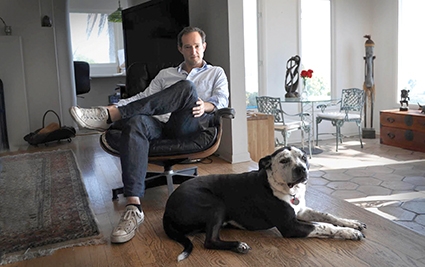Spectra Post Studio Has High Hopes for the Georgian Movie Industry
Thomas Burns, a Hollywood trained and award-winning director of photography, first came to Georgia almost twenty years ago and since then hasn’t been able to stay away. After seeing the hardships of the 1990s in Georgia, Burns, who holds a Master’s degree in film production from Stanford University, felt a burning desire to do something meaningful for the country. So he came back and set up ‘Spectra Post’, a post-production studio for films and television, to contribute to the Georgian film industry. Burns has over a decade of training experience in Hollywood on feature films, including well-known names like ‘Where the Wild Things Are’ and ‘Die Hard 4.’ His dramatic television experience includes CSI, Lost and Dexter and he has worked on documentaries for National Geographic and Discovery Channel, alongside numerous commercials for, amongst others, Porsche, McDonalds, Capital One, US Air Force and Toyota. Add to this the fact that he is a former US Fulbright Scholar and was awarded by the European Independent Film Festival for Best Cinematography in Paris in 2009. GEORGIA TODAY sat down with Thomas Burns to talk to him about his life in Tbilisi and about Spectra Post.
When did you first visit Georgia?
I first came to Georgia about twenty years ago. At the time I was working for the Eurasia Foundation and I then spent a year working for a small English language magazine in 1998-2000. Then I came back in 2009 as a Fulbright scholar to do a photography project¬—a series of portraits about the South Caucasus—and had an exhibition in Karvasla Gallery. After that I began thinking that Georgia was a place I wanted to live more permanently. In summer 2014 I came back to check out the possibilities. It was a big move from Los Angeles to Tbilisi.
What does it mean to be a Director of Photography?
A Director of Photography is the main visual designer of a film project. If you are a producer or director you hire me to move your ideas from the script onto the screen. I work closely with the Director and the Production Designer to develop a style for the project and then use camerawork and lighting to make sure we achieve our visual goals. I trained for a decade in Hollywood on feature films, dramatic television, music videos, and commercials. In addition to that, over the course of my time as a director of photography, I have also worked in post-production in an area we call ‘color grading.’ After a film is shot and edited, it goes through a process where we adjust every shot for color and exposure. Color grading allows us to make the lead actress’ dress look more red, the glass of beer look more refreshing, and the thunderstorm look more dramatic. It’s a very important part of the process.
One of the challenges for filmmakers in Georgia was that until now there was no professional color grading studio here in Tbilisi. Higher budget films and advertisements had to send their projects to Europe for color grading, and those without bigger budgets did the best they could here in Tbilisi.
We started Spectra Post here in December. Unlike most production companies here, we focus only on post-production. One hundred percent of our resources, expertise, and contacts go into color grading. Today we work mostly with American clients, but would like to be doing more work with Georgian filmmakers and advertising agencies. One of our first Georgian projects was a feature film for Georgian director Nana Jorjadze and it was a wonderful project—she’s a talented filmmaker.
There are some gifted professionals working in post-production in Georgia but the industry will benefit from leadership trained to international standards. This is something Spectra Post can provide. Our training, our network, and our professional ethic come from Hollywood. We want to use that to support advertisements and films that are being shot in Georgia. Georgians generally have strong visual literacy––they know good visual design when they see it––and that’s a good starting point for cinema.
Georgia has a long film history but isn’t well known in international film circles. Why do you think that is?
In order for filmmaking in Georgia to grow from a strictly artistic endeavor into a sustainable industry, in order for it to move from surviving to thriving, it requires foreign investment; investments in terms of foreign productions shooting here. When foreign productions come here and shoot, the local infrastructure expands and Georgian crews have an opportunity for international training. The more professional international training they have, the more productions will come here to shoot. I want to see filmmaking in Georgia become a viable industry not only as an artistic pursuit for the few, but as a bigger financial engine for the country in general. I think the Georgian government has realized the potential of the film industry and the new cash rebate program (offering 20-25 percent cash back for foreign productions that shoot here) is an incredibly interesting project because it will dramatically increase the number of such productions. Georgia is a great place to make movies but nobody really knows about it. Just in the past three or four months I’ve started getting calls from foreign producers asking me what kind of country Georgia is, asking if they can shoot here and so on. I think it’s a time of renaissance for Georgian cinema. Georgian cinema went dormant for a few years, but now it’s coming back. Now it’s aiming to come up to international standards very quickly and we hope we can contribute to this through the color grading we do at Spectra Post. Our main goal is to help Georgians push their film and advertising projects onto a bigger stage.
Meri Taliashvili












